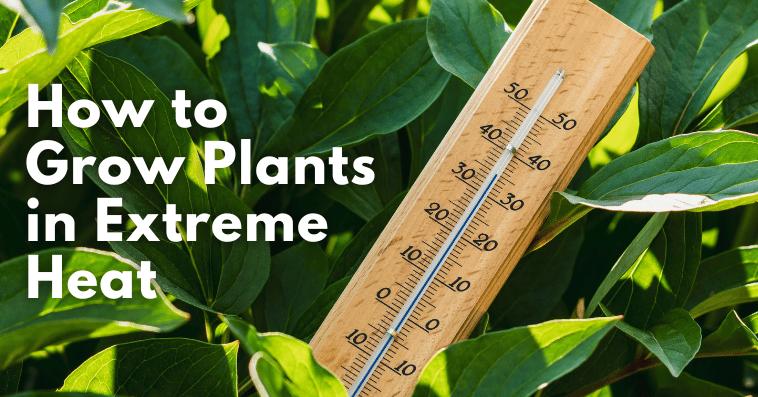Scorching temperatures. Dry soil. Drooping leaves. If you've tried to grow plants in extreme heat, you know it can feel like an uphill battle. But don’t give up your green dreams just yet!
Growing plants in hot weather is absolutely possible—with the right strategies, tools, and heat-tolerant plant choices. Whether you’re a balcony gardener, backyard grower, or urban farming enthusiast, this guide will show you how to keep your garden alive and thriving even during the hottest months of the year.
Let’s explore practical, science-backed tips on how to grow plants in extreme heat—without letting the sun fry your efforts.
🌱 1. Choose Heat-Tolerant Plants First
Your success starts with smart plant selection. Not all plants are created equal—some wilt in the sun, while others love heat and sun exposure.
Here are some best plants for hot climates:
- Bougainvillea – Loves full sun and needs very little water
- Aloe Vera – A hardy succulent that thrives in dry, hot conditions
- Marigold – Bright, colorful, and heat-tolerant
- Basil, Rosemary, and Thyme – Mediterranean herbs made for heat
- Portulaca (Moss Rose) – Ground cover that blooms in intense sunlight
Always check for “full sun” or “drought-tolerant” labels when buying seeds or saplings.
💧 2. Water Deeply, Not Frequently
Watering technique matters more than how often you water. In extreme heat, shallow watering can lead to weak roots and quick evaporation.
Instead, adopt deep watering techniques:
- Water plants early in the morning or late in the evening
- Focus water near the base of the plant, not on the leaves
- Use a drip irrigation system or soaker hose to reduce water loss
- Water less frequently, but allow moisture to reach deep into the soil
This encourages plants to grow deeper roots that can withstand high temperatures and dry spells.
🌿 3. Mulch is Your Garden’s Sunscreen
When it comes to beating the heat, mulching is non-negotiable. A thick layer of mulch shields the soil from sun, locks in moisture, and keeps plant roots cool.
Use organic mulch such as:
- Dried leaves
- Sugarcane bagasse
- Coconut husk
- Wood chips or straw
Apply 2-3 inches of mulch around the base of your plants. Avoid touching the stem to prevent rot. Mulching also suppresses weed growth, so it’s a win-win.
☂️ 4. Provide Shade During Peak Heat
Even sun-loving plants need a break from extreme afternoon heat. That’s where shade comes in.
Try these shade solutions:
- Shade netting (30% to 50% shade for veggies and herbs)
- DIY bamboo screens or trellises
- Use taller plants or climbers to create natural shade for smaller plants
- For container gardening, move pots temporarily to shaded spots during heatwaves
Think of shade as plant-friendly sunscreen—protective but still allowing filtered light.
🌬️ 5. Improve Air Circulation
Stagnant air and high humidity can lead to fungal infections and stressed plants. Make sure your garden has proper air movement, especially in compact spaces like balconies or patios.
Here’s how:
- Space your plants wisely—avoid overcrowding
- Trim lower leaves to allow airflow around the base
- Use vertical gardening setups to allow light and wind to move freely
- Avoid placing pots too close to walls that radiate heat
Better air circulation means healthier, happier plants, even during heatwaves.
🪴 6. Use the Right Containers and Soil
In container gardening, the type of pot and soil makes a huge difference in extreme temperatures.
Go for:
- Terracotta or clay pots – they allow natural evaporation and keep soil cool
- Light-colored containers – they reflect heat instead of absorbing it
- Well-draining soil mix – combine compost, garden soil, and cocopeat
- Add vermiculite or perlite – to enhance moisture retention
Avoid black plastic pots during summer—they trap heat and can “cook” the roots.
🌾 7. Fertilize Wisely (And Organically!)
In extreme heat, plants are already stressed. Adding strong chemical fertilizers can do more harm than good.
Stick to organic, slow-release fertilizers:
- Compost
- Vermicompost
- Seaweed extract
- Banana peel liquid fertilizer
Feed your plants every 2-3 weeks but avoid fertilizing during peak heat hours. Always water before applying fertilizers to avoid root burn.
📋 8. Watch for Heat Stress Symptoms
Stay alert and monitor your plants daily for signs of heat stress:
- Wilting or curling leaves
- Scorched leaf edges
- Flower and fruit drop
- Discoloration or sunburn patches
Early intervention is key. Provide extra shade, mulch, or hydration as needed.
🧤 Your Extreme Heat Gardening Checklist
✅ Choose sun-loving, drought-tolerant plants
✅ Water deeply and during cool hours
✅ Mulch heavily and organically
✅ Use light-colored, breathable containers
✅ Provide afternoon shade
✅ Improve airflow
✅ Use organic fertilizers
✅ Watch for signs of heat stress
🌱 Grow Smart, Even When It's Hot
Extreme heat doesn’t have to mean a dead garden. With the right planning and tools, your garden can not only survive but thrive in hot weather. The key lies in understanding plant needs and adapting your gardening routine to beat the heat.
And if you’re wondering where to find heat-tolerant plant varieties, eco-friendly gardening tools, organic fertilizers, and mulch — look no further!
🌿 Buy everything you need to grow plants in extreme heat from PaudheWale — India’s most trusted source for sustainable, high-quality gardening products.

